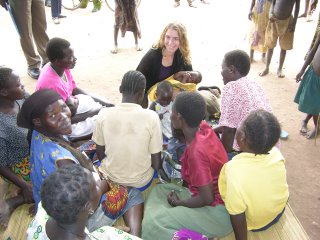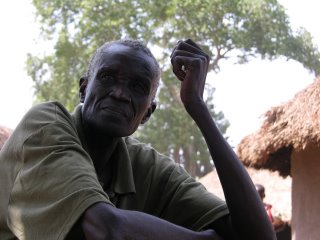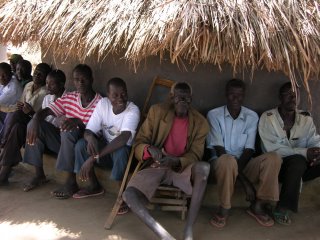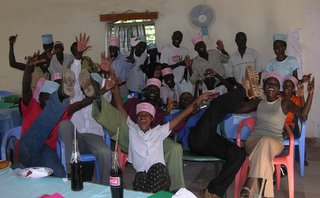
by: Holly
Last week I spent time in 4 different Internally Displaced People (IDP) Camps. There are some who prefer to call them “Protected Villages.” The label is grossly inaccurate and derides the suffering of the people who live there. It implies permanence—which may be what is intended by those who use it, but is not accepted by anyone who lives there. They want to go home. On the way to the camps I drove over bumpy roads with abandoned fertile fields that fed thousands of hungry mouths before the war. My colleague, himself displaced, as 94% of all those who live in Gulu are, pointed to a mango tree and then another and said, “You see, wherever you see a mango tree, that is the place where peoples homes used to be.” There are no villages in Gulu. There is only Gulu town and 53 IDP camps. The residents must be within the camp between 4:30 and 6:00 every evening depending on the camp and a strict curfew is enforced. After that the roads will be blocked and any patrolling UPDF might mistake the resident for a rebel. The same applies if they venture further than 3 km from their camp to “dig” the fields. I spent time with CPAs parent groups, youth groups, child mothers who were formerly abducted, camp leaders, elders, and others.

One of these women described how they sometimes become so discouraged that they want to commit suicide. Then they come to their friends in the Parent Support Group and they remind each other that their children need to find them alive when they finally come out of the bush. They have to persevere. They can’t give up. They have to hang on to hope.
One woman said that she passed by a center for formerly abducted children the other day and there were three kids who were just arriving having just been rescued from the LRA. And she wept. She said, “It gave me courage, to see them, it means that there are still children returning and that next time it might even be my son coming home to me.”

This man just learned that he is a grandfather. His granddaughter was born in the bush and was rescued two weeks ago by the Ugandan army. His son was abducted ten years ago and is still in the bush. Now he and his wife will raise the granddaughter and hope that someday her parents will come home. I asked him what he would say to his president if he could have lunch with him. He said, “I would tell him two things. First, I would ask him to stop using guns—use dialogue. The gun does not select. Our children will die without even knowing what they are dying for. They are dying for nothing. Second I would ask for an extension of Amnesty. It should be open.” Amnesty has been offered to combatants who surrender but it is due to expire in March next month. Anyone surrendering after that date could ostensibly be prosecuted regardless of the circumstances of their “enlistment” in the LRA.

I asked this man the same question. Tired, he said, “I just want to go home.”
During a conversation with one of the camp leaders he pressed his heart and admitted the thing that weighs on him and other elders the most is the youth. “We have many concerns I could tell you, but more than anything we are worried for his coming generation. This is no way to grow up. All of our cultural values are being lost. The ways that we used to pass them on to the young we cannot do here in the camp. It is all disintegrating. And when we look at them we worry for the future.” I asked him what he as a camp leader is doing to meet that challenge. He said that they the main thing he would like to do is to encourage some of the traditional ways of passing on cultural values like the “Wango” a gathering of the clan around a fire at night for the elders to tell stories, for debates, for dancing, for the young to ask the old their questions, for the life of the clan. The curfew is prohibitive of doing things in just the same way—wango should be after dark when everyone is required to be in their huts. He is waiting and hoping for a government decision to provide security and an exception to curfew.


